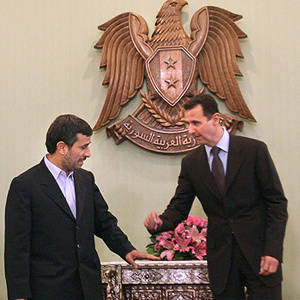Iran Knows How to Counterattack

The United States has appointed an ambassador in Damascus after five years at a time when Mahmoud Ahmadinejad travels to Syria to visit Bashar Assad and Hezbollah leader Sayyed Hassan Nasrullah. A few days later, leaders of Palestinian resistance groups gather in Tehran to meet the Iranian Supreme Leader. Mohammad Irani, Middle East affairs analyst has commented on the recent developments in Middle East:
During the recent years, two clear-cut political camps have formed in Middle East, both following their objectives persistently. In one camp, we have the United States, Israel and other so-called ‘moderate’ Arab countries that orchestrate their policies according to Americans’ Middle East strategy.
On the other side, there is the ‘resistance’ alliance that opposes extraregional forces and Israel. Now and again, the resistance camp starts a propaganda battle or threatens the US-centered opponent.
Israel, the primary cause of this bifurcation, has toughened its rhetoric and increased its threats against regional competitors in the recent months. One ramification of Tel Aviv’s tough language is that US efforts to revitalize the peace process between Arabs and Israelis may go up in smoke, with Arabs feeling more and more irritated and frightened by constant threats of a party that is supposed to be their peace partner.
For Israelis, the best scenario is not to sit at the table of negotiations with Palestinians. Fiery words within the recent months led to a verbal brawl between Damascus and Tel Aviv, even inciting Waleed al-Muallim and Bashar Assad to threaten Israel that if another war starts in the region, Tel Aviv will not stay immune from its consequences.
Israel has expanded the range of its belligerence to encompass Iran. IAEA’s latest report on Iran’s nuclear activities just made Israel more militant. Iran naturally reacted to this muscle-flexing: Ahmadinejad visited Syria, negotiated with Bashar Assad and held talks with Nasrullah. The meetings sparked a myriad of interpretations inside and outside Middle East, and gave a sign of the axis’ persistence on their principles. All these happened when a few days earlier, Hillary Clinton had asked Syria to part from Iran in order to show its good will towards regional reconciliation.
Ahmadinejad’s visit to Syria showed the Arab country’s view towards regional status and its own position is much stronger than empty promises about what it would receive if abandoned friendship with Iran. Syrians’ alliance with Iran serves their long-term plans and national interests.
The next piece of the puzzle is the trip made by Palestinian resistance groups to Tehran this week. The resistance movement, in form and content, has attention-worthy plans and can respond to any serious threat made by Israelis.

